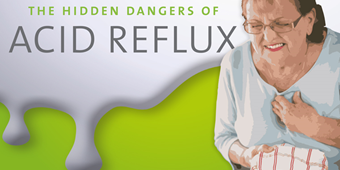Oops! Who Passed the Gas?

Find Your Perfect Match
Answer a few questions and we'll provide you with a list of primary care providers that best fit your needs.
Gas and bloating may be uncomfortable topics, but they’re a fact of life. We all have gas in our intestinal tract. And whether we admit it or not, everyone passes gas, anywhere from 13 to 21 times a day!
Too much gas can leave you feeling bloated, almost like there’s a balloon in your abdomen. It can even cause pain. But for most of us, the worst side effect is embarrassment.
What Are the Symptoms of Gas?
Chances are you’re all too familiar with at least one of these symptoms:
- Burping or belching when eating
- Passing gas
- Bloating, especially during or after a meal
- Abdominal pain when gas does not move normally through your intestines
What Causes Gas and Bloating?
Gas typically enters your digestive tract in two primary ways:
1. Swallowing too much air when eating and drinking
This is more likely to happen when you:
- Chew gum or suck on hard candy
- Eat or drink quickly
- Drink carbonated, or fizzy, beverages
- Smoke
- Wear loose-fitting dentures
- Have chronic postnasal drip
- Swallowed air that doesn’t escape your stomach by burping ends up moving into your intestines and passing through your anus.
2. Via bacteria in your large intestine
Some carbohydrates cannot be fully digested in the stomach and small intestine, so they pass into the large intestine, which naturally contains bacteria. When the bacteria go to work, they create gas. These foods can trigger excess gas:
- Vegetables like broccoli, cabbage, beans and asparagus
- Fruits, including apples, peaches and pears
- Whole grains such as bran and whole wheat
- Milk products including cheese, ice cream and yogurt
- Drinks such as apple and pear juice
- Sugar-free gum and candy that contain sorbitol
We all occasionally experience too much gas for harmless reasons. But some medical conditions can generate extra gas.
Can Gas and Bloating Signal More Serious Problems?

We all occasionally experience too much gas for harmless reasons. But some medical conditions can generate extra gas:
- Small intestinal bacterial overgrowth – an increase or change in the bacteria in your intestine that can cause gas, diarrhea and weight loss
- Irritable bowel syndrome (IBS), which can affect how gas moves through your intestines
- Gastroesophageal reflux disease (GERD), which if untreated can have serious consequences, even esophageal cancer
- Lactose intolerance, a reaction to milk products that can cause bloating, gas or diarrhea
- Celiac disease, an immune disorder in which gluten damages the lining of your small intestine
Talk with your doctor if you’re concerned that your symptoms may mean there’s something more worrisome going on.
How Can I Avoid Gas and Bloating?
You can minimize passing gas by:
- Cutting back on high-fiber foods
- Decreasing dairy products
- Chewing your food slowly and completely
- Avoiding gum and candy
- Bypassing carbonated or fizzy drinks
If excessive gas and bloating continue, ask your health care provider about medications that may ease your symptoms.
Find Your Perfect Match
Answer a few questions and we'll provide you with a list of primary care providers that best fit your needs.
Source: International Foundation for Functional Gastrointestinal Orders (IFFGD); National Institute of Diabetes and Digestive and Kidney Diseases; Medical University of South Carolina (MUSC); American College of Gastroenterology; Gas in the Digestive Trac




